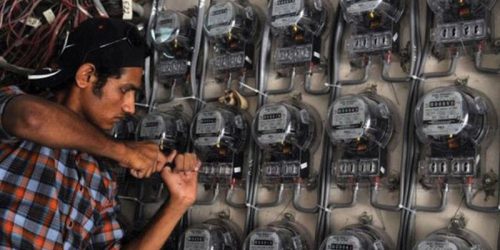ISLAMABAD: In a move towards reviving the International Monetary Fund (IMF) programme, the government has decided in principle to increase the electricity rates by about Rs1.90 per unit in the current billing month.
A formal announcement to this effect is expected to be made over the next couple of days. A federal minister told Dawn that a news conference had been called to explain the rationale behind the tariff increase but was called off at the last minute on the instructions of the Prime Minister Office.
The government had called the news conference after a meeting of the Cabinet Committee on Energy (CCoE) presided over by Planning and Development Minister Asad Umar. Besides Mr Umar, the presser was to be attended by Information Minister Shibli Faraz, Energy Minister Omar Ayub Khan and PM’s special assistant Tabish Gohar but was cancelled minutes before the schedule.
The cabinet member said the PM Office did not want the announcement for higher power tariff to coincide with an increase in petroleum prices due on Friday. Therefore, the news conference had to be cancelled and would be called again over the next couple of days.
However, the tariff increase would become effective from Jan 1, he added.
He said the National Electric and Power Regulatory Authority (Nepra) had determined an average increase of about Rs3.30 per unit in base tariff for all distribution companies (Discos) of ex-Wapda but a series of meetings at the Prime Minister Office had concluded that such an abrupt increase would be a serious setback to consumers who are already affected by Covid-19. Therefore, it was decided that increase in the first step should not be more than Rs1.90 per unit.
It has been decided that the tariff will be increased in phases and in the first phase, the prices will be increased by Rs1.90 per unit while the remaining amount will be passed on in the second phase, said the cabinet member.
Following an amendment to the Nepra Act, all 10 Discos had separately filed petitions for increase in their existing tariff for FY19 and FY20. The tariff increase sought by Discos ranged between 10 per cent and 27pc. However, on Dec 31, 2020, Nepra approved an increase of 24.72pc or Rs3.30 per unit in the average base price for FY19 and FY20.
As per Nepra’s determination, the base electricity price should increase from the existing Rs13.35 per unit to Rs16.65 per unit. The total impact of such an increase is estimated at about Rs280 billion.
Since the government has decided not to pass on the entire increase in one go and is likely to increase it by Rs1.90 in the first phase, the base price will go up from the existing Rs13.35 per unit to Rs15.25. The total impact of the increase will be around Rs177bn, an official said.
Meanwhile, the CCoE on Thursday directed the relevant officials to finalise agreements with the independent power producers (IPPs) with whom the memorandum of understandings (MoUs) had already been signed during the current month. The meeting also directed the relevant authorities to complete the negotiation process with the remaining IPPs as soon as possible.
The sources said the CCoE also asked the authorities that agreements with those IPPs under the power policies of 1994, 2002 and 2006 should be signed this month without waiting for the Feb 12 expiry date and the remaining IPPs should also be pursued to sign the MoUs.
Moreover, an official statement said the Power Division presented the design of the Competitive Trading Bilateral Contract Market (CTBCM) for consideration and review of the CCoE. The division also apprised the committee of its implementation plan.
The committee was informed that in the first phase, consumers with a load of 1MW or above would participate in the competitive market. These consumers represent around 16pc of the total electricity sales. More consumers will be added to the market subsequently when the market stabilises and matures. The committee gave approval to the design principles and implementation plan of the CTBCM.
The Power Division also updated the committee on implementation of the circular debt reduction plan. The committee directed the power ministry to conclude the open items and submit formal proposals to the Economic Coordination Committee for a final decision.





